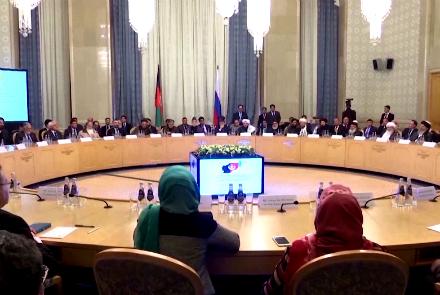Presidential hopeful Mohammad Haneef Atmar, who is attending the Moscow talks, gave journalists a brief update about the session on Wednesday and said "we are extremely optimistic about the results".
On Tuesday afternoon he said a press release would be issued within a few hours "which will reflect the key agreements achieved at the meeting. It's very positive, good news."
This comes after a senior Taliban member and deputy head of their Qatar office said on Monday, after the first day’s session, that the group would talk to the Afghan government once a timeline was set for the complete withdrawal of US forces from Afghanistan.
Abdul Salam Hanafi said the Taliban would talk, on camera, to the Afghan government about disputed issues, including a ceasefire, once a timeframe was announced about the withdrawal of foreign troops.
“The Americans told us that they will withdraw half of their forces from Afghanistan from first of February until end of April,” said Hanafi.
“Today a lot of Afghans sit together, we believe InshaAllah (God willing) after the withdrawal of foreign forces, after the withdrawal of occupation forces, we can sit together and we can resolve all issues together.
We all of us agreed on the withdrawal of foreign forces and the establishment of an Islamic government and making a constitution – an Islamic constitution,” he said.
On Tuesday, former president Hamid Karzai said the existence of the current government was vital in terms of seeking a negotiated settlement to the ongoing conflict in the country and insisted on the need for the Taliban to engage in dialogue with government.
Delegates share views:
"We understand that the government in Kabul needs to be part of these negotiations, we wish that they would have been here today," said Karzai adding it was an “issue that the Islamic Movement of Taliban and the Afghan government have to resolve.”
Meanwhile, Taliban’s chief negotiator Abbas Stanakzai said after Tuesday’s session in Moscow that “ninety nine percent of the whole population of Afghanistan are Muslims. So any government that comes into power would be an Islamic government; we would call it an Islamic government according to Islamic rules. So the constitution would be Islamic, there would be no doubt - it would be for a long time and it would be after this also. So he means that the future government would be called an Islamic government.”
Stanakzai said: “And today's discussion as we said before, it was very good, in a good atmosphere and fruitful. It was a sort of conference - every body was exchanging their own views regarding peace.”
“So this is the fist step which will take us to peace, in future we will have more meetings and we can go further. We are hopeful that we will achieve that goal, which is peace forever in Afghanistan,” he added.
Another delegate attending the talks was Fawzia Kofie. She said: “They (the Taliban) came up with a 13 article position about women's rights.
“They said women can work, women can be educated, women cannot be presidents though - they can be prime ministers.
“The important thing is we don't bargain about positions here, we bargain about the fact that women in Afghanistan are respected, as equal human rights holders, and I think that was important that they listened to this voice. I think their views were changed to some extent but we have to carefully watch the situation,” she said.
“The atmosphere of the talks (on the first day) was very constructive,” said Mohammad Mohaqiq, the second deputy of CEO Abdullah Abdullah.
“Today we had a very productive and good meeting, the Afghans who had differences with each other gathered here in order to reach a solution to end the problem in their common country Afghanistan and for lasting peace.
“There was unanimity of views among all participants that the war was not the solution and we should resolve our problems through intra-Afghan dialogue,” said former vice president Mohammad Younus Qanooni.
Government Says Moscow Talks Hold No Weight
Earlier this week, President Ashraf Ghani said the Afghan politicians attending the Moscow Talks have no executive authorities and are not officially representing Afghanistan.
Ghani also questioned the mechanism of the Moscow Talks and said: “With whom, what will they agree upon there? Where is their executive power? Let hundreds of such meetings be held, but these would only be paper (agreements) unless there is an agreement by the Afghan government; Afghanistan’s national assembly and Afghanistan’s legal institutions.”
In addition, a number of civil society activists on Wednesday demonstrated outside the Russian embassy and came out in support of the Afghan National Defense and Security Forces and opposed the proposal for the establishment of an interim government.
In other civil society action, residents in Nangarhar, Paktia and Helmand provinces organized separate meetings where they slammed Stanakzai over his recent remarks about the Afghan security forces – which he said would be dissolved if peace was agreed on .



Comment this post